A theory of second best
What is the best poem? The best play? The best sculpture? The best work of architecture? I’m not qualified to say, but I think I know which work has the reputation of being the greatest in its field. (The Divine Comedy, Hamlet, David, Taj Mahal.)
Now consider second best. What is the second greatest work in each field? Isn’t that question much harder to answer?
[As an aside, I don’t believe that every field has an obvious number one. What’s the best novel? War and Peace? Ulysses? In Search of Lost Time? Don Quixote? Madame Bovary?
And what’s the greatest rock album? Heck, there are three of four possibilities for the greatest album by the Beatles, or Dylan, or the Stones. No obvious “focal point”.]
Today I’d like to search for the second best painting. (I could look for the best, but that question seems too easy to be interesting.) Let’s start with Velazquez, often regarded as the greatest painter of all time. What’s his second best painting? I have no idea. His best history painting is probably The Surrender of Breda:
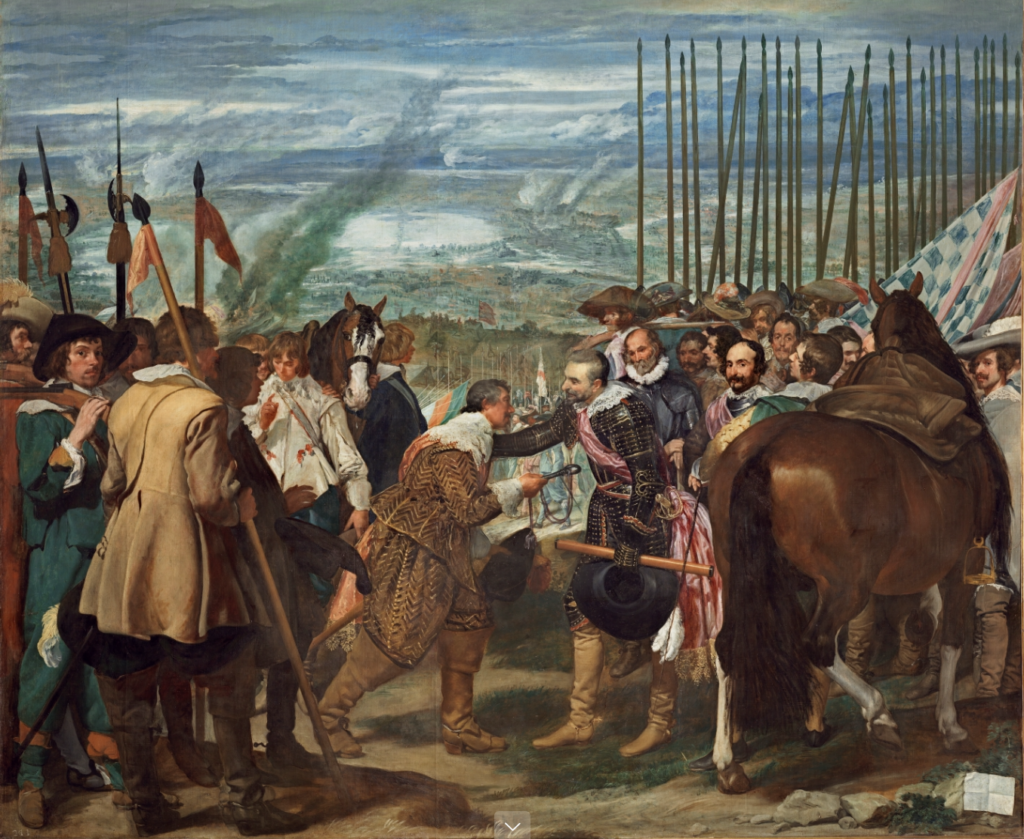
His best portrait is probably Juan de Pareja:
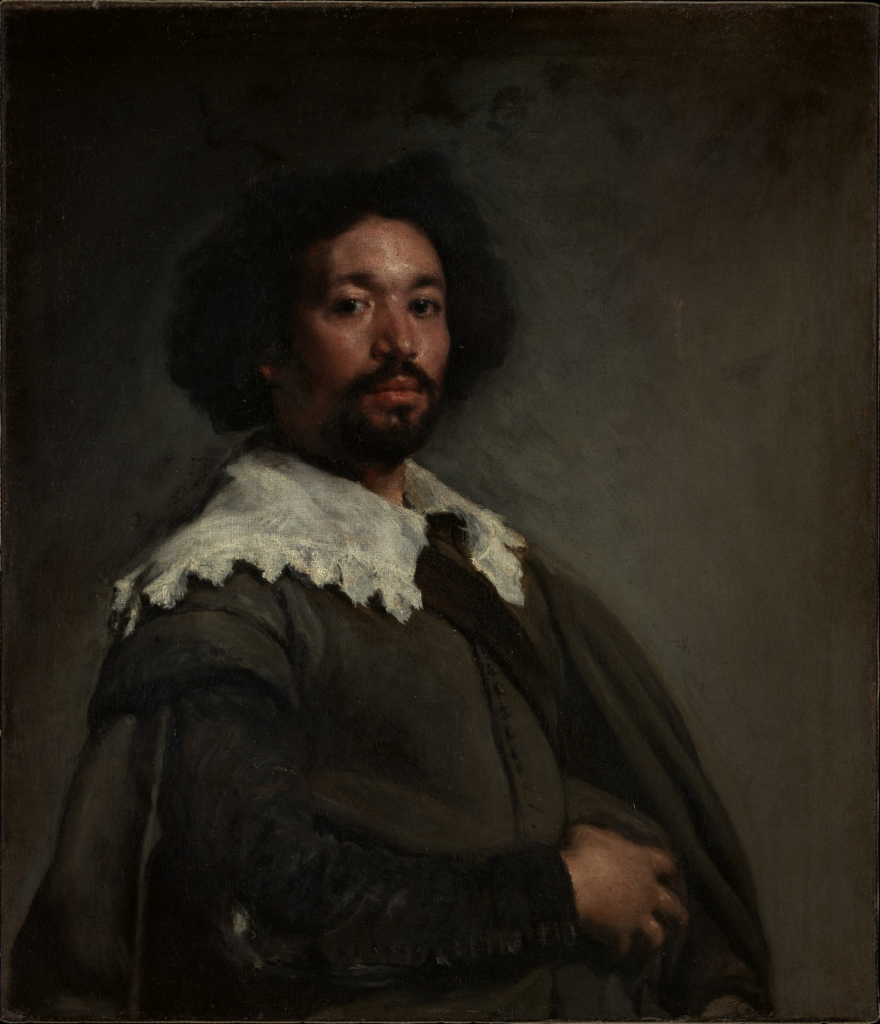
I’m old enough to recall then the Met bought this (in 1971) for the then record price of $5.5 million, which seems absurdly low, even accounting for the effects of inflation.
His best (only?) nude is certainly the Rokeby Venus:
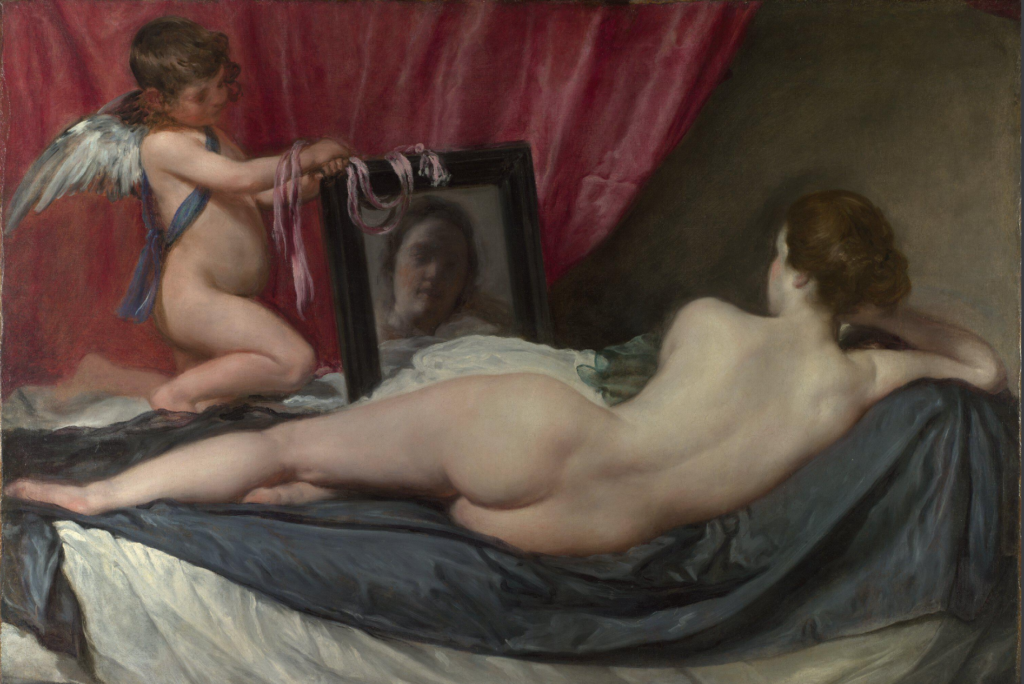
When you go to an art museum, most paintings from the Baroque era have a sort of “old masterish” quality, which makes them seem dated. These two paintings by Velasquez have an uncanny timeless quality. Indeed this was even recognized at the time. When Juan de Pareja was first displayed in Italy, it astounded viewers with its life-like quality. I’m not aware of any reaction to the Rokeby Venus, which presumably was displayed only in private due to its “pornographic” quality. But it certainly looks far more modern than a nude by Giorgioni, Titian or Rubens.
Alternatively, we might look for the Velazquez painting that most resembles the number one painting, say The Spinners (which was recently restored):
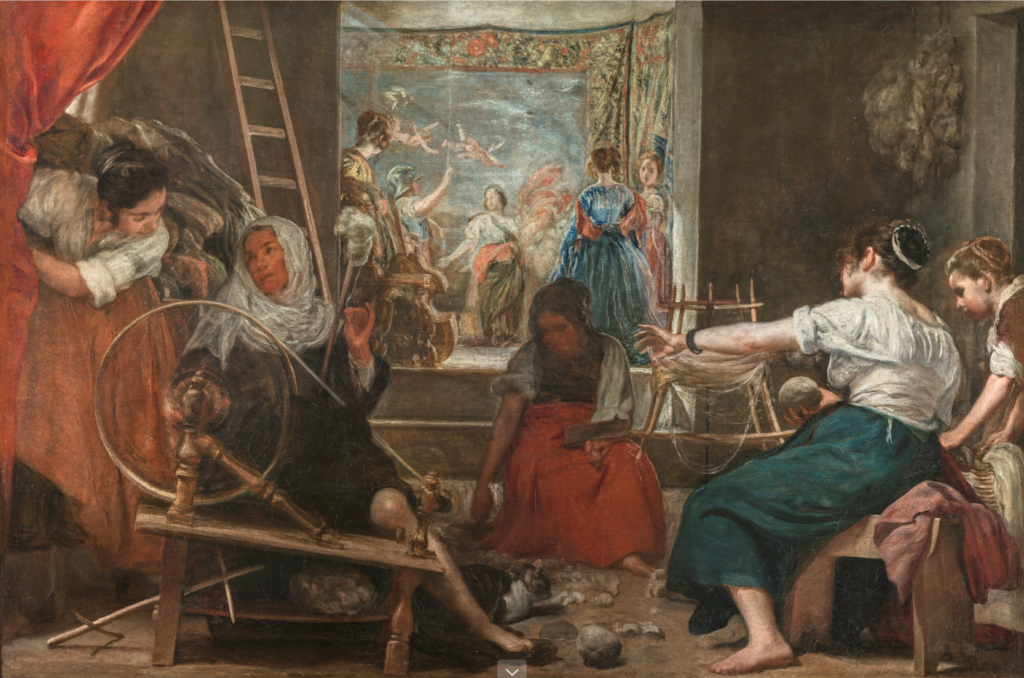
Like the number one painting, this doesn’t reproduce well and must be seen in person.
Notice that Velazquez tips his hat to Titian by placing a tapestry of The Rape of Europa in the background:
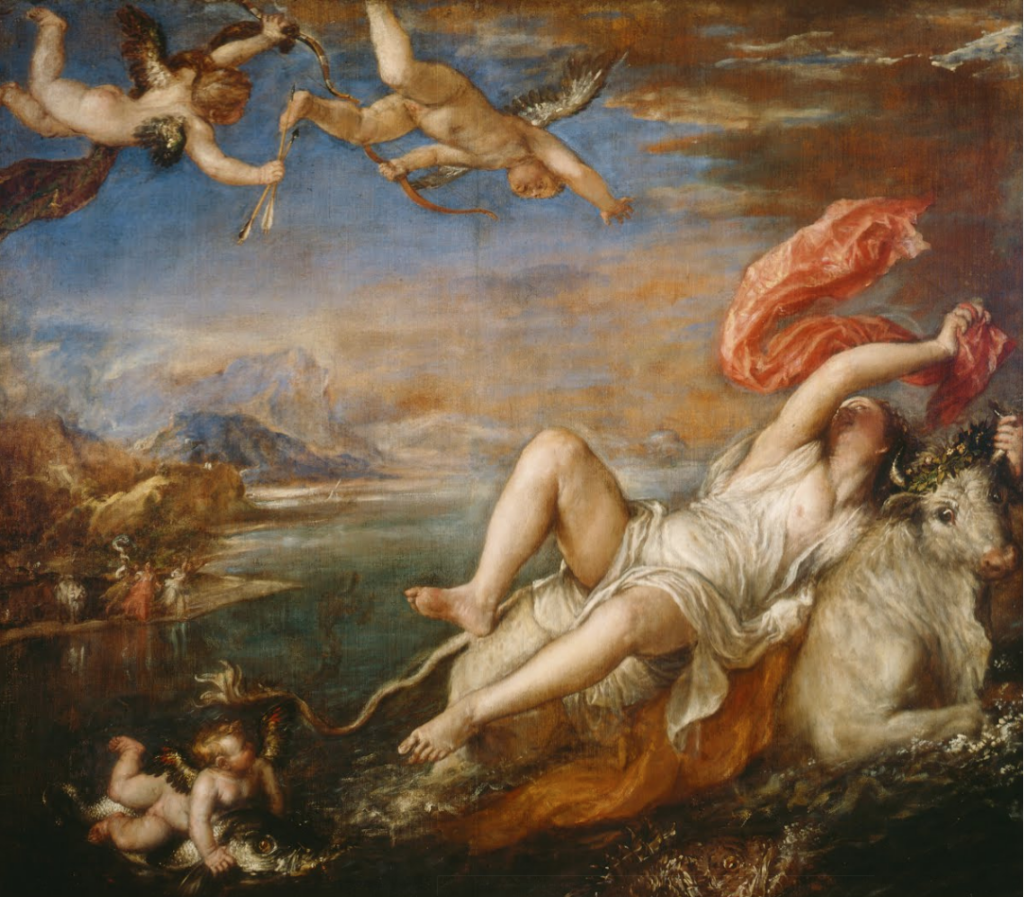
I recall an art expect claiming that Titian’s masterpiece was the greatest painting in the Western hemisphere. But given the disparity between the two hemispheres, that’s almost as weak a compliment as being called the greatest painting in the Southern hemisphere.
Instead of looking for the second best painting by the greatest painter, perhaps we should be searching for the best painting by the second best painter?
That task is not easy, as Vermeer produced many fewer paintings than Velasquez, and the quality tends to be more uniform. They all tend to be rather small, and near perfect. Should we look for an example of the sort of painting that he was most associated with, say a woman standing near a window? If so, which one?
Or an outdoor scene, like View of Delft or The Little Street? Or a portrait, such as Girl with a Pearl Earring?
In the end, I lean toward The Allegory of Painting:
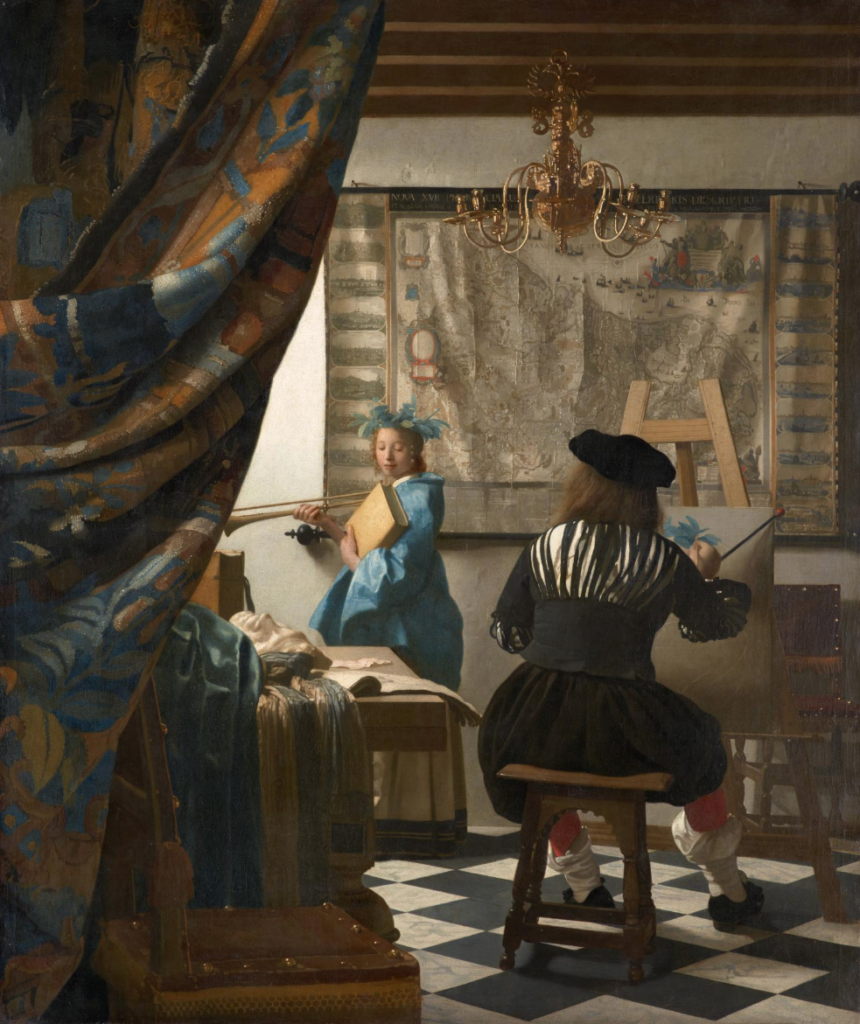
Last year, I traveled all the way to Vienna to see this painting, and it was not on display. Interestingly, of all of Vermeer’s paintings, this is the one with a composition that most resembles Las Meninas:
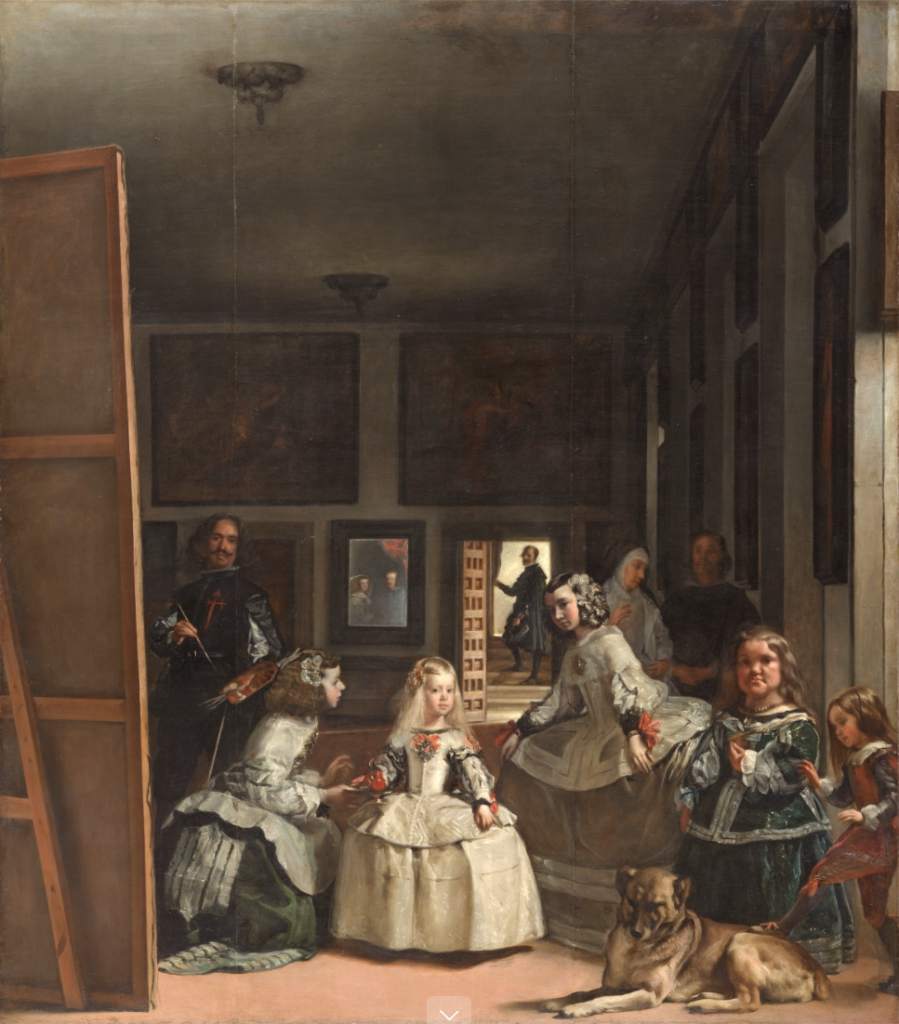
You might wonder if I’m just an old reactionary, ignoring all the great art produced in recent centuries. I don’t think so. These paintings by Velazquez and Vermeer are actually more recent that the greatest works of poetry, drama, sculpture and architecture cited at the top of the post.
These two painters took realism as far as it could go, and achieved the most profound effects. After that, painting stagnated for 150 years, becoming somewhat decorative. In the nineteenth century, painters began a long series of visual experiments. When those were exhausted around 1960, conceptual art took over. But no single modern experiment, no matter how impressive, can compete with the perfection of a great Velasquez or Vermeer.
They painted at roughly the same time, for the same reason that Newton and Leibnitz worked on calculus at roughly the same time. It was the appropriate time to produce a new form of math, and the appropriate time to produce the most perfect paintings. Sorry, you can’t invent a new form of math or produce great paintings, because you were born too late.
I have a bias toward technique, but there are other ways to evaluate art, such as the emotional force of an image. Using that criterion, we can begin considering more “primitive” painters, such as Giotto. Since it’s Easter, how about concluding with the famous Isenheim Altarpiece:
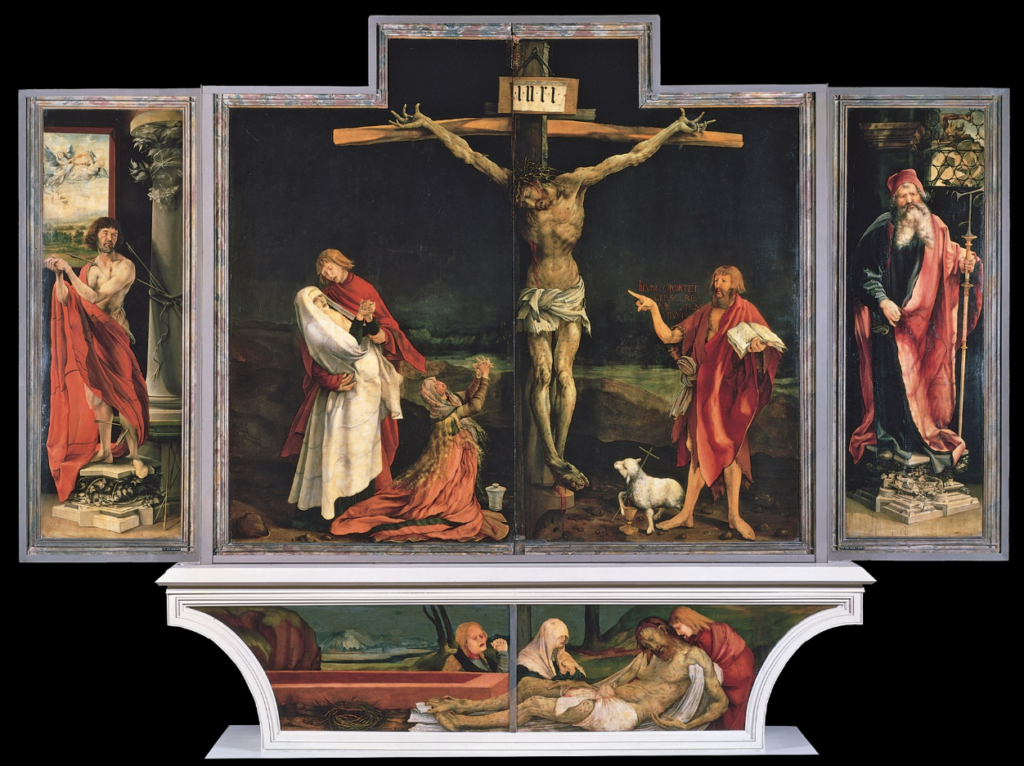
PS. The Illustrated London News did survey of art experts back in 1985. This photo is from a Boston Phoenix article discussing the poll:

The Phoenix did its own poll, and American art experts had broadly similar views to those in the UK:
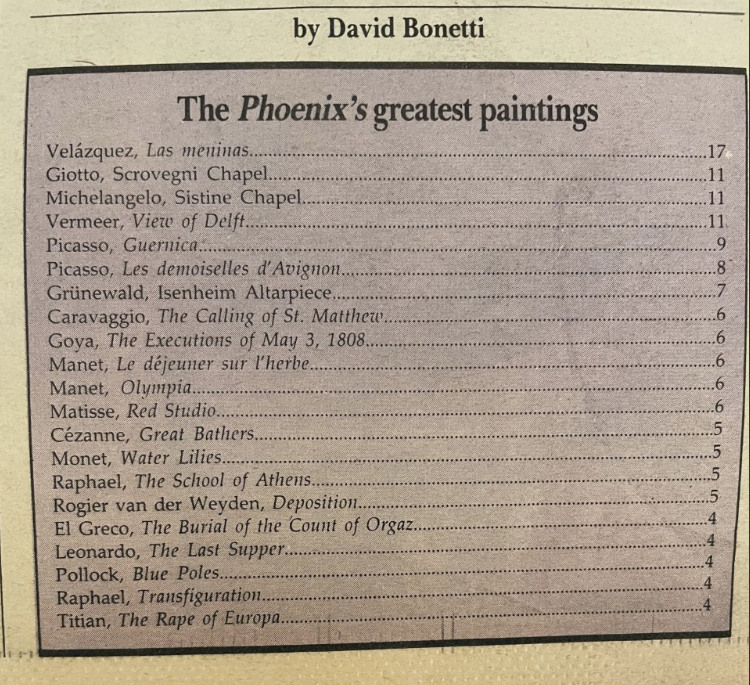
Note the striking changes in these two 1985 surveys from the earlier (1950) “Masterpieces” survey. The author of the Phoenix article (David Bonetti) had this to say about the differences:
I think we can detect in both 1985 lists, especially the British, a shift in taste from the blockbuster to the subtle, the complex, and the personal, a shift from which both Vermeer and Velazquez were bound to benefit.
Tags:


9. April 2023 at 11:23
I know nothing about art markets. I will just point out that US NGDP is up ~20 fold since 1971. No idea if that picture would sell for $110 million today. Or say half a billion, which would be ~3% return above NGDP growth. I should go look up stock returns, Lol.
9. April 2023 at 15:20
Interestingly, almost all of the most expensive paintings today are modern. To quote Wikipedia, there are “currently only nine pre-1875 paintings among the listed top 89, and none created between 1635 and 1874”. The top of that list is Salvator Mundi by da Vinci. The second on the list is Interchange by de Kooning, so I suppose that would be the second best by value.
From a slightly different angle, while it hasn’t been sold, the painting that has been valued the highest has been the Mona Lisa, insured for $100 million in 1962, or about $900 million today. So maybe Salvator Mundi comes second?
But I suppose money can’t be used to really assess a painting. There are so many ways to say what makes a painting good – all of my favorites are by van Gogh – and what makes someone value a painting highly isn’t going to be the same as what makes a painting truly great.
10. April 2023 at 06:26
Fun post. And 3 great lists. I need to go see some more of these paintings in persons.
10. April 2023 at 07:23
@ gt, I imagine that is partially (mainly?) because most old masters are either in museums or the private collections of people who do not wish/need to sell them.
10. April 2023 at 10:17
I can’t say which painting or painter I would call first or second best, but I think I’d add some landscape paintings and painters for consideration to your offerings and the 1950 and 1985 lists.
An imam once came up to me when I was wandering around the Blue Mosque in Istanbul. For some reason he selected me to voice his displeasure to about some restoration work that had just been done to the mosque. I don’t know why he chose me, maybe he just figured rightly that I was someone who had never been there before and might not have had time to form any fixed opinions. He looked at me and said, “you came at the wrong time. It looks nice now, but before they did this work, you came in here and you just went ‘AAAHHH’. You know what I mean, right.”
I don’t think I’ve seen Velasquez or Vermeer in person, so I can’t speak to their effect on me, but I have seen some paintings on those lists that got me to go ‘AAAHHH’: The Sistine Chapel, The Calling of St. Matthew and The Night Watch. And, I’d add some Pissarro landscapes to the list as well.
10. April 2023 at 10:36
Bill, You said:
“No idea if that picture would sell for $110 million today.”
I assure you that the Getty Museum would gladly pay that amount, indeed much more than that figure. I suspect Qatar or the UAE would pay at least $300 million.
gt, In the case of works like Salvator Mundi, it’s not about the artistic merit, it’s about the prestige of owning a Da Vinci. Even his notebooks sell for very high prices.
Carl, Those are certainly great works, although I think Rembrandt’s smaller paintings are often superior to the grand “Night Watch”.
https://artsandculture.google.com/asset/return-of-the-prodigal-son/5QFIEhic3owZ-A?hl=en&ms=%7B%22x%22%3A0.5%2C%22y%22%3A0.5%2C%22z%22%3A9.315743233352352%2C%22size%22%3A%7B%22width%22%3A3.4764074355433245%2C%22height%22%3A1.2375000000000003%7D%7D
10. April 2023 at 10:38
Sumner often tells us that he’s concerned about the manmade effects of Global warming, yet here in this article he tells us he took a plane to Austria just to see a painting.
He wants to limit cow farts and travel for others, and supports a drug cartel leader in Brazil (da silva) to help save the rainforest (the drug cartels aren’t kind to the rainforest), but he’ll burn 72000 gallons of jet fuel (20 hour flight) to visit a painting in person which he could easily see online.
In that way, he has a lot in common with his beloved CCP and the old USSR.
As the apparatchik loves to say:
“One rule for thee, another for me.”
10. April 2023 at 13:53
$300 million. A return about equal to NGDP growth plus 2%. Less than the S&P 500?
10. April 2023 at 15:52
i’m sorry, the greatest paintings are in fact mosaics, of which all painting is derivative, and achingly poorly so.
10. April 2023 at 16:38
Bill, That’s a non sequitur, comparing a consumer good to a financial asset. You would expect paintings to have a much lower financial rate of return. Ditto for jewelry, houses, etc.
11. April 2023 at 03:42
Secretly, I like those paintings of dogs playing poker best.
11. April 2023 at 07:02
Scott, have you read any of the economist David Galenson’s papers on artists? He has some published articles where he aggregates things like # of mentions by artwork in art textbooks & where expert surveys rank paintings; then he compares his findings to the prices paintings were last bought. He also tries to detect if there’s systematic similarities between the works of various artists whose greatest paintings (according to the data he collected) came early in their career and similarities between the works of artists who peaked at the end of their career. I find it interesting.
11. April 2023 at 07:35
Scott:
I take your point about the Rembrandts. I was dragging my son through the Getty museum a couple of years ago, when he just stopped in front of a Rembrandt portrait and stood there for a good five minutes admiring the verisimilitude of the expression and features.
On a totally unrelated note, I just read a commentary on a speech by JD Vance on the consequences of having the reserve currency. He compared it to the curse of oil wealth and the Dutch disease. He claimed it contributed to an outsized financial sector, excessive government debt and an undersized export sector. I often read of attempts by China and Russia to displace the dollar as the reserve currency. I’d be curious to hear your take on what losing our reserve currency status might mean for the US.
11. April 2023 at 08:29
Don’t know much about art but I’d make an common vote that Lady Godiva by John Collier is the 2nd best painting of all time. Again, I know nothing about art, but my eyes are drawn to the most beautiful thing in nature… the female form lol. I am biased but it just is.
11. April 2023 at 08:29
*uncommon vote.
11. April 2023 at 09:49
Solon, Those are also among my favorites.
SoerenK, I read that a long time ago. Is my recollection correct that pre-1900 artists emphasized craftsmanship and peaked late in life? And post-1900 artists emphasized experimentation, and peaked early in life?
Student, You said:
“my eyes are drawn to the most beautiful thing in nature”
I suppose there’s a evolutionary explanation for that attraction. But beauty and artistic merit are two different things.
11. April 2023 at 10:02
Fair enough. I honestly don’t know anything about art. But it’s a beautiful painting and it’s interesting that her apocryphal naked ride through the streets of Coventry was to gain a remission of the oppressive taxation that her husband imposed on his tenants. Also, it’s interesting that Collier was a utilitarian that favored a secular view on human morality. Just my two cents on a beautiful portrait.
11. April 2023 at 10:05
I also like the vibrant use of colors. Some of the classics are rather dark and kinda dull. Prolly due to residue but I don’t know.
11. April 2023 at 10:12
This is one of those topics that’s interesting partly because of the way that it’s uninteresting.
Obviously the arguments of any individual critic can be enlightening but the “critical consensus” is to a great extent a bureaucratic outcome, as I think was demonstrated in spectacular fashion by the recent (or maybe every) Sight & Sound list.
These art lists seem somewhat immune to that – maybe because there’s no argument (yet) for the inclusion of someone who isn’t a dead European male? But are they immune to all things bureaucratic?
“I’m not qualified to say, but I think I know which work has the reputation of being the greatest in its field. (The Divine Comedy, Hamlet, David, Taj Mahal.)”
I’m a little skeptical – isn’t this more like “most famous among the general public” than “greatest, according to people in the field?”
The “Divine Comedy” as having “the reputation of being the greatest [poem]” I would not have guessed – I think it would get a lower percentage of the corresponding vote for that than the Velazquez painting, which is under 20% in both lists. (I could be wrong).
Better examples might be “best novel in French” (Proust) and “best novel in Spanish” (Cervantes) and maybe something similar for German and Goethe? Or “best playwright” (Shakespeare)?
(Correction after re-reading OP: maybe SS is right, Flaubert might challenge Proust, I don’t know. I don’t think Marquez challenges Cervantes, but again could be wrong.)
(Man, “greatest novel in English” – does anything get even 10% of that vote, even Ulysses?)
And maybe Hamlet has some sort of wide rep as best play but among “serious Shakespeareans,” I wonder if Hamlet gets over 20% as best *Shakespeare* play. I’ve been told that “best tragedy” is an ongoing argument between Hamlet and Lear, and then beyond that you have a lot of Tempest partisans, I believe, plus all the people who think the Histories are superior to the Tragedies. (Again, perhaps totally wrong, maybe Hamlet really does dominate).
11. April 2023 at 10:24
On “best rock album by x” it might get easier if you change it from “album” to “song.” (Which is for the artists mentioned I think more insightful as to what they were up to, particularly in the case of the Beatles, where much of their best work didn’t even appear on albums).
Beatles I would think it would be between “Strawberry Fields Forever” and “A Day in the Life.”
Dylan “Like a Rolling Stone?”
Stones “Sympathy For the Devil?”
(I’m not referring to my own view, which would be different for Dylan and the Stones, at least – this is “what would inevitably win the vote, a la the Velazquez painting”).
11. April 2023 at 10:47
A goofy follow-up question (I enjoy this general topic too much, obviously) would be “if you were forced to invest all of your money in futures markets for the critical reputations of artists, how would you invest?”
Should I be buying Velazquez and Vermeer, or have they now peaked?
11. April 2023 at 11:09
Student, Many of those look brighter after the varnish has been cleaned and the yellowing removed. Toggle back and forth on these Sistine Chapel paintings (which may have been overcleaned):
https://www.davidbcalhoun.com/sistine-chapel-restorations/
anon/portly, Agree about The Beatles and Dylan, but critics might pick Gimme Shelter over Sympathy for the Devil.
And yes, best song is easier to predict than best album.
As I recall, when Shakespeare first became famous on the Continent, literary types immediately gravitated to Hamlet as being special, and modern critics like Harold Bloom still feel that way. I’m confident that Hamlet would win a poll.
I cannot imagine any poem getting more votes than The Divine Comedy, or even close to the number of votes. Any suggestions?
I’m least confident about the Taj Mahal, but again I cannot think of a specific building that would get more votes.
Your Sight and Sound poll observation points to a measurement problem. Even if Jeanne Dielman gets more votes than Vertigo, 2001 and The Godfather in a widely split field, it would probably trail in a head to head vote against any of those in a final runoff.
Velazquez and Vermeer most likely have peaked, because they are currently at the top. Hokusai may be underrated. He’s probably a top ten of all time artist.
11. April 2023 at 13:12
The Sistine chapel paintings are my number 1 of all time. Maybe the greatest work of art I have ever laid my own eyes upon… but I was referring to number 2.
11. April 2023 at 13:17
And while I am commenting… the Hagia Sophia beats the Taj Mahal but a wide margin. I mean, it’s even 1,000 years older.
11. April 2023 at 15:17
Scott,
I believe Galenson’s theory isn’t based on before or after 1900, though he does suggest that artists in the last fifty+ years have leaned towards peaking early. He splits artists into “conceptualists” who are very “idea” based and “experimentalists” who record perceptions/reality and keep on refining their work. Conceptualists peak early because if the idea is what is innovative, once the idea gets out there it’s not as influential. Experimentalists peak late because craftsmanship is necessary to adequately portray reality beautifully. So Cezanne would be an example of a “experimentalist” because he kept on working and working on similar paintings that Galenson suggests were more about recording reality; Picasso would be the epitome of a conceptualist as his cubism with fragmented angles was a groundbreaking idea and there’s a wide variety of his works (he wasn’t slowly improving similar works again and again). Warhol’s a conceptualist. I think Galenson categorized Vermeer as one and Rembrandt as the other. I can’t remember who was which.
This is what Galenson argues in his papers I think.
11. April 2023 at 15:20
You are correct.
Though I tend to think of houses as investments, and count the “place to live” as a tax free dividend. So maybe art has a dividend called “viewing pleasure”? Impossible to quantify. Lol.
11. April 2023 at 16:48
even retired sumner is more wrong than clever.
1. bloom would NOT choose Hamlet as best WS overall. Rather Othello.
2. dante would NOT even say his DC is better than the Iliad.
3. Duh, it would be neither but rather Satisfaction, Jumping JF or Brown Sugar before either of those show standards.
11. April 2023 at 21:59
Student, You said:
“the Hagia Sophia beats the Taj Mahal but a wide margin”
As a feat of engineering that’s certainly true. As architecture? It’s debatable.
SoerenK, Yes, that’s basically how I recall the paper. Cezanne peaked late and Picasso peaked early.
Yersina, I recall Bloom claiming Hamlet was unsurpassed. Did he change his mind?
Disagree about Dante.
I really like those three Stones songs, but I suspect Gimme Shelter would poll better (even if it’s not as good.)
13. April 2023 at 07:24
Good point Scott. It is quite stunning.
13. April 2023 at 09:12
I would pretty strongly disagree with this theory, and I think the problem is that the categories given in the post are much too overly broad to conclusively settle on a first best.
Some of the comments do a better job on zeroing in on tractable categories, and the answers to second-best become more clear along with greater clarity for first-best. For example, what is the best play? It is pretty obviously Lear or Hamlet (Lear is better), which leads to the obvious conclusion that 2nd best is that whichever of the two isn’t first. Greatest rock band? 1 and 2 are very obviously the Beatles and Stones. But greatest poem? I mean, the Divine Comedy probably is not as good of an epic as the Iliad, and how are we supposed to judge epics against shorter poems?
13. April 2023 at 09:33
derek, You said:
“Greatest rock band?”
I never asked that question. Obviously, the Beatles would win a vote on that question.
I still believe that Hamlet and The Divine Comedy would win a vote of literary experts.
13. April 2023 at 10:03
“I cannot imagine any poem getting more votes than The Divine Comedy, or even close to the number of votes. Any suggestions?”
Paradise Lost? Beowulf? Eugene Onegin? You’re probably right.
yersinia pestis brought up Homer, and I was thinking of the Iliad and the Oddysey, but wasn’t sure if they counted as “poems” per se.
Not very knowledgeable on poetry. Am also wondering if a vote of modern “experts,” if repeated like the S&S Film thing, would lead inevitably to some sort of “Jeanne Dielman” type outcome.
“Your Sight and Sound poll observation points to a measurement problem.”
But also it’s bureaucratic in multiple ways, one of which is that I think a lot of film critics, when they make their list, are thinking along the lines of “what does my list say about me?”
That’s one obvious reason, I think, why the film directors list is always going to be better – less social pressure to conform.
“I really like those three Stones songs, but I suspect Gimme Shelter would poll better (even if it’s not as good.)”
Maybe The Stones are as tough as it comes to guess what would win a “best song” poll. With a lot of bands – Floyd, Zep, Who, Eagles – it seems easy. Sympathy seemed like the obvious one but maybe Shelter (or Satisfaction, or Paint it Black, or Wild Horses?) would win.
I’d probably vote for Shelter, which is why I’m skeptical it would win.
14. April 2023 at 13:15
“Obviously, the Beatles would win a vote on that question.”
Back in the day, the Marsh/Marcus/Bangs/Fricke/Pareles et al days, I don’t think the Beatles would have beaten the Stones in any critics poll. The Beatles were somewhat McCartneyish.
But over the last 50 years, the Stones have been out there, touring and releasing and what have you, while the Beatles’ legacy is relatively untarnished, so maybe if this is true that’s why?
14. April 2023 at 14:06
Anon/portly, You said:
“With a lot of bands – Floyd, Zep, Who, Eagles – it seems easy.”
Not to me. Thus Stairway to Heaven would win a popular poll, but I’m talking about a poll of critics. When the Levee Breaks? Kashmir? I’m a fan of The Who, and have no idea which of their songs would be picked. (Dylan picked My Generation in his new book on classic songs.) Ditto for Pink Floyd.
I am confident that the Beatles would now poll above the Stones (even though I prefer the Stones, and prefer Dylan over either of them.) But back around 1969-72 you might have been right.
As far as Dante and Milton, check out Ruskin’s Modern Painters, volume 2 part 2 chapter 3:
https://www.gutenberg.org/files/29906/29906-h/29906-h.htm#s2c3p1
16. April 2023 at 10:43
“Stairway to Heaven would win a popular poll, but I’m talking about a poll of critics. When the Levee Breaks? Kashmir?”
My idea, really, is than in any sort of halfway decently constructed and conducted poll, it would surprise me very much if Stairway didn’t win.
I could be wrong – I’m really not enough of a Zep fan, to be sure. But Stairway seems to me to be held in very high regard for its musical qualities, and is also iconic or anthemic. It seems like the tune that will elicit the greatest disappointment – even within a representative sample of jaded, snotty, snobby, or even amazingly astute rock critics – if it doesn’t get played at the reunion concert.
Maybe Kashmir or Levee is simply considered too superior, musically, or is nearly or just as iconic and the vote could go that way, but I’m skeptical.
Stairway is simply a monument – tell me you can watch the following version of it, and imagine this being (a suitably bludgeoning performance of) Kashmir instead. No way I want to live in such a heartless world. (Smile emoji).
https://www.youtube.com/watch?v=LFxOaDeJmXk
And When the Levee Breaks is really not a Led Zeppelin tune at all – not any more! It has left the vale of dinosaur rock for greener pastures. (Smile emoji #2).
https://www.youtube.com/watch?v=vNkXoS3zutw
16. April 2023 at 11:04
Obviously this isn’t an important enough topic that I have to go on here, but as always you’re dealing with an idiot.
” I’m a fan of The Who, and have no idea which of their songs would be picked.”
I’ll retract that one – to me it seems like their “Stairway” has always been Won’t Get Fooled Again.
I also am a fan of The Who but only a fan of sorts – I don’t like Won’t Get Fooled Again. That’s perhaps blinded me to the possibility that critics, or even other Who fans, might make a choice more in line with my own view.
17. April 2023 at 06:11
anon/portly, Good clips, and I see your point. It seems like a lot of critics view the second half of the song as being far superior to the first half.
Won’t Get Fooled Again may not even be the best song on Who’s Next, so I agree with you there. I guess your point is that works of art that are “grand statements” get picked over smaller and yet higher quality examples, which may be correct.
When I saw The Who live back in 1975, Won’t Get Fooled Again was the “show stopper”.
7. May 2023 at 10:51
Obviously what you consider second best will be influenced a lot by how you define best. That said i think three are probably a few ways you could think about second best.
One theory might be that second best is similar to the best, just with some perhaps minor flaw. I don’t know if the brothers karamazov is the best novel, but it’s certainly one that comes to mind. BK successfully synthesizes the novel as an art form (the story of the relationships and conflicts between its characters) with moral-metaphysical themes by making these central to the plot. Because morality and metaphysics are the most interesting and important topics, this makes it one of the best novels ever. Under this theory, the second best novel might be something like atlas shrugged, which is a very similar synthesis of plot with moral-metaphysical themes, just not as good (still a good book, though). Under another theory, perhaps the second best work should contrast with the best in some way. It could be an outstanding example of the novel as an extended examination of its characters nature and relationships, just with different themes. Then one might think of something like a tale of two cities or pride and prejudice. On the other hand you could choose something that has similar themes but handles them in a different way. For example, i like the novel 2666, which has a similar focus on violence and death, but much less interest in characters’ motivations and relationships, which makes it perhaps a poor exemplar of the novel as an art form.